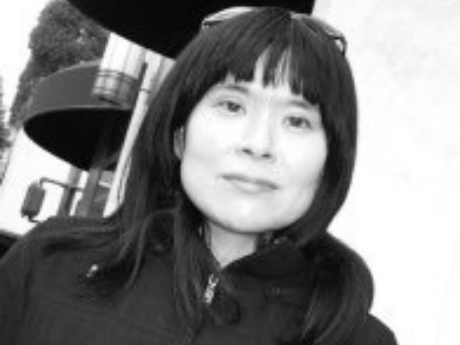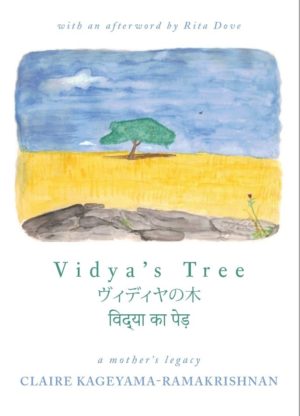In Their Own Words
Adrienne Su on Claire Kageyama-Ramakrishnan

Deep-Sea Magic
When I was young,
my grandfather
treasured me like a peach.
He struck the match
and lit the Eastern sun, netted
the carp swimming
over the wooden shingles
of our house.
The West L.A. sky
shrank between his knuckles.
The deep-sea, our swimming
pool, snagged our carved line
of detergent bottle tunas.
•
Today it is my husband
who loves me as my grandfather did,
and cherishes our daughter.
From Vidya's Tree (Bull City Press, 2019). All rights reserved. Reprinted with permission of Bull City Press.
On Claire Kageyama-Ramakrishnan
Vidya's Tree opens with the phrase "When I was young" and closes with "We're in Heaven—it's this beautiful garden."
Claire could not have intended the resonance with the context in which this chapbook appears. Her illness and death came quickly and unexpectedly, in the prime of her working life. Healthy and in her mid-forties, she was balancing a heavy teaching load, the raising of a young daughter, and the writing of her third book-length manuscript, not a chapbook of final poems.
As her grieving friend, I now isolate those phrases for my own purposes. I selfishly read "When I was young" as that two-year period in our early twenties when Claire and I were MFA candidates in creative writing at the University of Virginia, and take "Heaven" to be the "beautiful garden" in which Claire might now be enjoying a Satsuma orange tree with her parents. In context, of course, these are not what the phrases describe. "When I was young" refers to the poet's childhood, and "We're in Heaven—it's this beautiful garden" imagines the poet's deceased parents trying to speak to their living daughter. But the pleasure of poetry is that lines can do double duty, serving both the reader's and writer's purposes, and I'm sure Jon Loomis and Rajesh Ramakrishnan placed these bookends with this doubleness in mind.
I see those two years at UVA as the youth of Claire's career. She had just graduated from college and was able to make poetry the center of her life for the first time. She and I spent lengthy days and nights talking about poetry and our hopes for the future. We imagined who we might become as poets, where we might publish our first books, and how subject matter might come to mark us. Both American born but having ongoing experiences shaped by race, we wondered to what extent we should write about Japan and China, countries more foreign than familiar, yet significant in ways we felt compelled to explore. What would become of us if we did or didn't address them? We conjectured about where we might end up living and how much writing time might be available in responsible adulthood. We also did our best to seize the present, often through the shared pleasures of cooking and eating, but our young ages and student status forced us to be future-oriented.
A quarter-century later, entrenched in responsible adulthood, I write after a different two years, two years of awareness that Claire is gone from the planet. Since the shock of her death, my daily life has not been much different on the surface—we lived many miles apart and had not been in regular touch over the years—but Claire was and is a lasting part of my creative foundation. Over the decades, sitting down to write or read, I felt assured by the knowledge that she was depicting the landscapes of her native L.A., asking tough questions about family, and imaginatively inhabiting the visual art she loved. I could hear her, in my head, setting me straight when I started second-guessing my drafts. Now I imagine her doing so from that "beautiful garden."
That is, I am forced to look backward where, with Claire, I used to look forward. Reading Vidya's Tree, I see the maturation of her longtime fascination with Frida Kahlo; the resolution of those early struggles with subject matter in "After the Earthquake and Tsunami, 2011"; her knowledge of meter and rhyme fully integrated into her deployment of free verse; and her gift for plain statement brought to an apex in "The Backyard Garden in Houston," constructed entirely of end-stopped lines, each its own sentence. These poems, like all good poems, are gifts to the future. The tragedy is that the future came so soon. I hope this collection will be gratefully received not only by Claire's existing readers but also by many who are hearing her voice for the first time, as well as by others who will hear it in another era, perhaps after all of us are gone.
—Adrienne Su
foreword reprinted from Vidya's Tree



